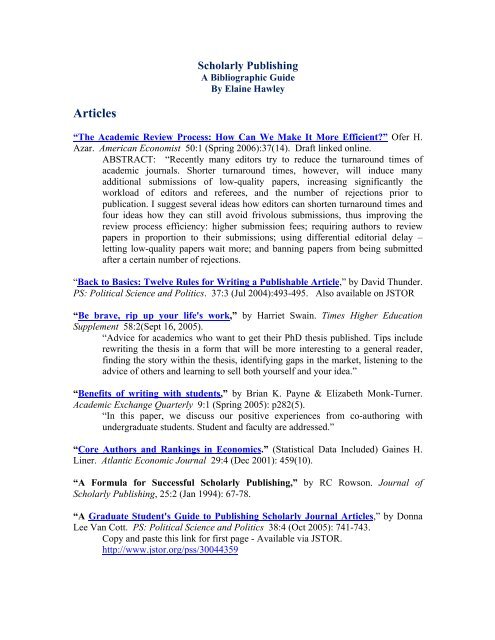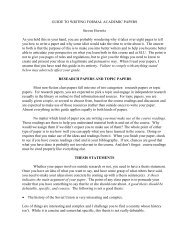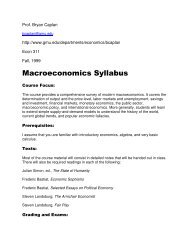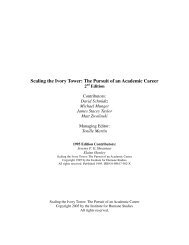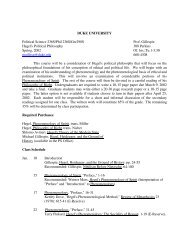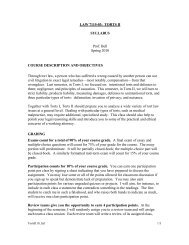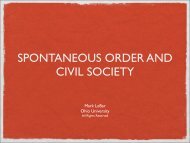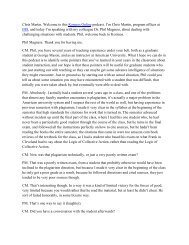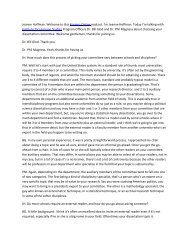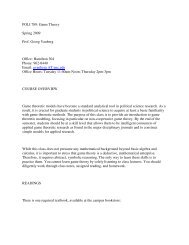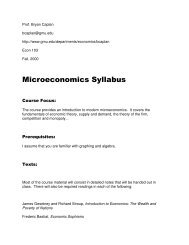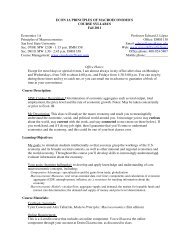Scholarly Publishing Bibliography - Kosmos
Scholarly Publishing Bibliography - Kosmos
Scholarly Publishing Bibliography - Kosmos
You also want an ePaper? Increase the reach of your titles
YUMPU automatically turns print PDFs into web optimized ePapers that Google loves.
<strong>Scholarly</strong> <strong>Publishing</strong><br />
A Bibliographic Guide<br />
By Elaine Hawley<br />
Articles<br />
“The Academic Review Process: How Can We Make It More Efficient?” Ofer H.<br />
Azar. American Economist 50:1 (Spring 2006):37(14). Draft linked online.<br />
ABSTRACT: “Recently many editors try to reduce the turnaround times of<br />
academic journals. Shorter turnaround times, however, will induce many<br />
additional submissions of low-quality papers, increasing significantly the<br />
workload of editors and referees, and the number of rejections prior to<br />
publication. I suggest several ideas how editors can shorten turnaround times and<br />
four ideas how they can still avoid frivolous submissions, thus improving the<br />
review process efficiency: higher submission fees; requiring authors to review<br />
papers in proportion to their submissions; using differential editorial delay –<br />
letting low-quality papers wait more; and banning papers from being submitted<br />
after a certain number of rejections.<br />
“Back to Basics: Twelve Rules for Writing a Publishable Article,” by David Thunder.<br />
PS: Political Science and Politics. 37:3 (Jul 2004):493-495. Also available on JSTOR<br />
“Be brave, rip up your life's work,” by Harriet Swain. Times Higher Education<br />
Supplement 58:2(Sept 16, 2005).<br />
“Advice for academics who want to get their PhD thesis published. Tips include<br />
rewriting the thesis in a form that will be more interesting to a general reader,<br />
finding the story within the thesis, identifying gaps in the market, listening to the<br />
advice of others and learning to sell both yourself and your idea.”<br />
“Benefits of writing with students,” by Brian K. Payne & Elizabeth Monk-Turner.<br />
Academic Exchange Quarterly 9:1 (Spring 2005): p282(5).<br />
“In this paper, we discuss our positive experiences from co-authoring with<br />
undergraduate students. Student and faculty are addressed.”<br />
“Core Authors and Rankings in Economics.” (Statistical Data Included) Gaines H.<br />
Liner. Atlantic Economic Journal 29:4 (Dec 2001): 459(10).<br />
“A Formula for Successful <strong>Scholarly</strong> <strong>Publishing</strong>,” by RC Rowson. Journal of<br />
<strong>Scholarly</strong> <strong>Publishing</strong>, 25:2 (Jan 1994): 67-78.<br />
“A Graduate Student's Guide to <strong>Publishing</strong> <strong>Scholarly</strong> Journal Articles,” by Donna<br />
Lee Van Cott. PS: Political Science and Politics 38:4 (Oct 2005): 741-743.<br />
Copy and paste this link for first page - Available via JSTOR.<br />
http://www.jstor.org/pss/30044359
“Graduate Training and Research Productivity in the 1990s: A Look at Who<br />
Publishes,” by James M McCormick; Tom W Rice PS (American Political Science<br />
Ass’n) (Sept 2001):675-680.<br />
Available on JSTOR<br />
“The relationship between reputational rankings of political science departments<br />
and their scholarly productivity remains a source of discussion and controversy.<br />
McCormick and Rice address the question of the relationship between reputation<br />
and productivity for political science departments, but their approach differs from<br />
earlier studies in several ways.”<br />
“How Are the Mighty Fallen: Rejected Classic Articles by Leading Economists,” by<br />
Joshua Gans and George Shepard. Journal of Economic Perspectives, 8:1 (Winter 1994):<br />
165-179.<br />
“This paper is at once hilarious and sobering.”<br />
“How Many Authors Does it Take to Publish an Article? Trends and Patterns in<br />
Political Science,” by Bonnie S. Fisher, Craig Cobane, & Thomas M. Vander Ven. PS<br />
31:4 (Dec. 1998):847-56.<br />
If link does not upload, copy and paste link for first page; full text available on<br />
JSTOR.<br />
http://www.jstor.org/pss/420730<br />
“A study was conducted analyzing trends and patterns of multiple-authored<br />
journal articles in political science over time. Data were collected from articles<br />
published in three political journals--American Political Science Review,<br />
American Journal of Political Science, and Journal of Politics. Findings indicated<br />
that approximately half of all the articles published in political science journals<br />
are multiple authored, representing a jump of 42 percent since the 1950s. It is<br />
suggested that multiple authorship is becoming the norm within political science.”<br />
How to Publish a Book – from a special section of PS: Political Science and Politics<br />
(Oct 2005) with several good articles about book publishing: Available from JSTOR.<br />
“A Guide to <strong>Publishing</strong> Your First Book: The Ins and Outs of Obtaining a<br />
Book Contract, by Alana S. Jeydel. PS: Political Science and Politics<br />
38:4(2005): 745-746.<br />
“Arranging the Right Book Contract,” by David S. Meyer. PS: Political<br />
Science & Politics 38:4(2005): 746-746.<br />
“Seven Modest Tips on <strong>Publishing</strong>,” by Robert J. Spitzer. PS: Political Science<br />
& Politics 38:4(2005): 746-747.<br />
“The Other End of the Telescope (Tips from an Editor), by Peter Labella.<br />
PS: Political Science & Politics 38:4(2005): 747-748.<br />
“How to Publish in a “Good” Journal,” by Daniel S. Hamermesh. Online article.
“An outline of powerpoint slides from his talk on this topic. Interesting for<br />
discussion but not completely informative in this format.”<br />
“How to Publish in <strong>Scholarly</strong> Journals,” by Janette K. Klingner, David Scanlon &<br />
Michael Pressley. Educational Researcher 34:8 (Nov 2005):14-20.<br />
Also Available on JSTOR<br />
“How to Publish in Top Journals,” edited by by Kwan Choi. RIE (available in<br />
sections, online)<br />
This manual will advise authors on how to prepare papers to improve their<br />
chances for acceptance in top journals.<br />
“The Less Obvious Elements of an Effective Book Proposal,” by Patrick H.<br />
Alexander. Chronicle of Higher Education, Oct 13, 2011.<br />
Offers strategies to increase chances of having a publisher take your proposal and<br />
manuscript to the review level—especially if you're an early-career scholar<br />
seeking to turn a dissertation into a book.”<br />
“Maximizing the Substance in the Soundbite: A Media Guide for Economists, by<br />
Daniel S. Hamermesh. Journal of Economic Education, 2004.<br />
Abstract: “This guide aims to induce more economists to talk to people in the<br />
media as a means of expanding educational outreach. It provides discussions of<br />
“dos” and “don’ts” and offers advice on which kinds of research are likely to<br />
interest reporters. It suggests specific approaches to dealing with reporters in<br />
different types of media, including print, radio and television.”<br />
“The Other Pipeline: Ten Steps to Navigating Papers through Academic Journals,”<br />
by Cecilia Elena Rouse, Princeton University<br />
“You’ve successfully completed your doctorate and landed a plum academic job,<br />
and you even have a great paper you’ve just finished. Does this mean that you can<br />
now sit back and relax? No! In many respects, your work has just begun. In<br />
academia, you get some credit for completing a first draft, but the true rewards<br />
come from publishing it… Although it might not seem so, it is possible to<br />
navigate this process and retain one’s sanity. I lay out some of my thoughts on the<br />
steps to publishing papers in academic (economics) journals.”<br />
“Proposal Writing--A Remedy for a Missing Part of Graduate Training,” by Stephen<br />
L Wasby. PS: Political Science and Politics (June 2001):309-312.<br />
If link does not upload, copy and paste link for first page; full text available on<br />
JSTOR. http://www.jstor.org/pss/1350249<br />
Graduate work in the social sciences generally does not provide students with<br />
much, if any, experience in writing proposals. Wasby has constructed a seminar<br />
on research proposal writing for doctoral students. The seminar is open to<br />
students in departments across the social sciences and education.
“A Short Tour of Book <strong>Publishing</strong> for Political Scientists,” by Charles T. Myers. PS:<br />
Political Science and Politics 37: 3 (Jul 2004):489-491.<br />
Also available on JSTOR<br />
“What Are Book Editors Looking For?” By Dedi Felman (an executive editor at<br />
Oxford University Press.) The Chronicle of Higher Education 52.46 (July 21, 2006).<br />
“Despite the latest headlines about Google Print or the e-book, our mission<br />
remains remarkably stable. We're looking for the same thing we've always looked<br />
for -- solid, readable, provocative, and important works of scholarship with clear<br />
ideas at their core. And if you know some of the basics of good writing, you have<br />
already improved your starting score.”<br />
“Writing a Paper that Will Get Published,” by Kate Devine. The Scientist 15:7(April<br />
2, 2001): 30. Also reprinted in Tomorrow’s Professor listserve linked above.<br />
“Writing for Professional Journals: Paradoxes and Promises.” by Kenneth T.<br />
Henson. Phi Delta Kappan, 82:10 (June 2001):765.<br />
If link does not upload, copy and paste link for first page; full text available on<br />
JSTOR. http://www.jstor.org/pss/20440034<br />
“Writing Tips for Ph. D. Students,” by John Cochrane. 2005.<br />
“Always put your contact info on the front page so that people can find your<br />
paper and send you comments! It’s the 21st century — get a web page. If your<br />
paper is ready for a faculty member to read it, it should be on your webpage. Put<br />
the date on the paper so people know if they are reading a new version.”<br />
“The Young Person's Guide to Writing Economic Theory,” by William Thomson.<br />
The Journal of Economic Literature 37:1 (Mar. 1999): 157- 83.<br />
ABSTRACT: “The writer offers advice on writing economic theory and, in<br />
particular, the presentation of formal models. Topics discussed include the general<br />
principles of good writing; notation; definitions; and the presentation of proofs.”
Books and Websites<br />
AAUP - Home Page The Association of American University Presses<br />
Directory of publishers:<br />
These listings include street and mailing addresses, main phone and fax numbers,<br />
and an email contact and Web address for each press.<br />
Finding a publisher<br />
Presses.<br />
Includes a useful Subject Area Grid for most Academic<br />
An Author's Guide to <strong>Scholarly</strong> <strong>Publishing</strong> by Robin Derricourt. Princeton University<br />
Pr; 1996.<br />
“In An Author's Guide to <strong>Scholarly</strong> <strong>Publishing</strong>, Robin Derricourt divides his<br />
energy between informing potential authors about the ins and outs of scholarly<br />
publishing and training them to be the kinds of writers scholarly publishers enjoy<br />
working with. For 12 years the publishing director for Cambridge University<br />
Press… and a published academician himself, Derricourt brings a tremendous<br />
amount of knowledge to his subject.”<br />
The Book <strong>Publishing</strong> Industry, by Albert N. Greco. 2 nd ed. Lawrence Erlbaum<br />
Associates, 2005.<br />
While focused on the publishing industry itself, this volume has an extensive<br />
bibliography available via Google Books, linked above.<br />
Cite It Right by Julia Johns and Sarah Keller. 2d ed. SourceAid, LLC, 2005.<br />
The Clockwork Muse: A Practical Guide to Writing Theses, Dissertations, and Books<br />
by Eviatar Zerubavel. Harvard University Press, 1999.<br />
“The Clockwork Muse is designed to help prospective authors develop a workable<br />
timetable for completing long and often formidable projects. The author<br />
describes how to set up a writing schedule and regular work habits that will take<br />
most of the anxiety and procrastination out of long-term writing, and even make it<br />
enjoyable. The Clockwork Muse rethinks the writing process in terms of time and<br />
organization.”<br />
The Craft of Research (Chicago Guides to Writing, Editing, and <strong>Publishing</strong>) by Wayne<br />
C. Booth, Gregory G. Colomb & Joseph M. Williams. University of Chicago Pr., 1995.<br />
“This manual offers practical advice on the fundamentals of research to college<br />
and university students in all fields of study. The Craft of Research teaches much<br />
more than the mechanics of fact gathering: it explains how to approach a research<br />
project as an analytical process. The authors chart every stage of research, from<br />
finding a topic and generating research questions about it to marshalling evidence,<br />
constructing arguments, and writing everything up in a final report that is a model<br />
of authority. Their advice is designed for use by both beginners and seasoned<br />
practitioners, and for projects from class papers to dissertations.”
Craftways : On the Organization of <strong>Scholarly</strong> Work, by Aaron Wildavsky. 2 nd ed.<br />
Transaction, 1993.<br />
From Amazon reviews:<br />
“While a plethora of books have been written about various studies in social<br />
science, few works are dedicated to the instruction of how to be an effective<br />
social science scholar. Serious students are not only interested in their specialty<br />
subject, but also in how academic life is lived and how scholarly work is carried<br />
out. In this edition Wildavsky provides an introduction to the norms and mores of<br />
political science in particular and social science in general.”<br />
Economical Writing, by Deirdre McCloskey. 2d ed. Waveland Pr., 1999.<br />
From Amazon.com reviews:<br />
“Professor McCloskey has written the best short guide to academic prose in the<br />
language.” -- Richard Lanham, UCLA<br />
From Dissertation to Book (Chicago Guides to Writing, Editing, and <strong>Publishing</strong>) by<br />
William Germano. University of Chicago Press, 2005.<br />
“This book should be handed to the candidate at the conclusion of all doctoral<br />
defenses.” Eric Foner, Columbia University.<br />
Gatekeepers of Knowledge : Journal Editors in the Sciences and Social Sciences by<br />
Stephen McGinty Bergin & Garvey, 1999.<br />
“What are journal editors looking for in a manuscript? This fascinating book is<br />
built around interviews with thirty-five scholarly journal editors, revealing the<br />
crucial issues that inform the work of these important players in the realm of<br />
scholarly communication.”<br />
Getting into Print : The Decision-Making Process in <strong>Scholarly</strong> <strong>Publishing</strong> by Walter<br />
W. Powell. University of Chicago Press, 1988.<br />
Getting It Published; A Guide for Scholars and Anyone Else Serious about Serious<br />
Books (Chicago Guides to Writing, Editing, and <strong>Publishing</strong>) by William P. Germano.<br />
2 nd ed. University of Chicago, 2008.<br />
Getting Published : The Acquisition Process at University Presses, by Paul Parsons.<br />
University of Tennessee Pr, 1989.<br />
A Guide to Academic Writing, by Jeffrey A. Cantor. Praeger, 1993.<br />
Abstract: “This book presents a comprehensive guide to academic writing and<br />
publishing, approaching the subject within the context of understanding academic<br />
tenure and promotion decisions. The book first provides an overview of the<br />
various avenues for publication, such as scholarly journals, books, and conference<br />
and symposium papers.”<br />
A Guide to MLA Documentation: With an Appendix on Apa Style (English Essentials.)<br />
7 th ed., by Joseph F. Trimmer. Houghton Mifflin College, 2005.
MLA Style Manual and Guide to <strong>Scholarly</strong> <strong>Publishing</strong> (3 rd ed.) Modern Language<br />
Association of America, 2008.<br />
“A classic handbook that serves scholars as useful guide to the art of writing.”<br />
On Writing Well, 30th Anniversary Edition: The Classic Guide to Writing Nonfiction,<br />
by Willian Zinsser. Harper, 2006.<br />
With more than a million copies sold, this volume has stood the test of time and<br />
remains a valuable resource for writers and would-be writers.<br />
Persist and Publish : Helpful Hints for Academic Writing and <strong>Publishing</strong> by Ralph E.<br />
Matkin, & T.F. Riggar. University Pr of Colorado, 1991.<br />
Abstract: “A clear, concise explanation of the requirements for successful<br />
academic writing in any field. This book describes a variety of publication<br />
experiences and reflections and offers guidelines on academic writing for college<br />
and university faculty to increase productivity and achievement in the “publish or<br />
perish” academic world.”<br />
The Production of Knowledge; the Challenge of Social Science Research. Oxford<br />
University Pr., 2006.<br />
From Amazon: Book Description<br />
“Bill Starbuck has been one of the leading management researchers in the United<br />
States over several decades. In this book he reflects on a number of challenges<br />
associated with management and social science research - the search for a<br />
'behavioral science', the limits of rationality, the lack of reliability in many<br />
research findings, the social shaping of research agendas, cultures and judgments.<br />
It is an engaging, chronologically structured account in which he discusses some<br />
of his own research projects and various methodological debates. This is a feisty<br />
and polemical view from someone who has been fully engaged with all aspects of<br />
research - carrying out research programs, evaluating research, tirelessly<br />
questioning the assumptions and claims of social science research, and never<br />
avoiding the awkward theoretical or practical challenges that face organizational<br />
researchers. Well written, provocative and unusual, this quasi autobiographical<br />
account will inform and entertain, and be a valuable vade mecum to current and<br />
future research students.”<br />
Publish, Don't Perish by Joseph M. Moxley. Praeger, 1992.<br />
“Moxley actually thinks more highly of academic publishing than his title<br />
suggests. Drawing from his writing seminars, he offers guidance to faculty<br />
members on conceiving, developing, and publishing scholarly books and journal<br />
articles. He considers the composition process, various types of writing, abstracts,<br />
proposals, editorial standards, political and economic factors, and how institutions<br />
can encourage scholarly writing and publishing.”<br />
<strong>Publishing</strong> Economics: Analyses of the Academic Journal Market in Economics edited<br />
by Joshua Gans. New ed. Edward Elgar; 2001.
Amazon Book Description<br />
“This collection tackles the issues confronting the up and coming economist. The<br />
authors include some of the subject's finest luminaries who offer friendly and<br />
invaluable advice as well as providing a more light-hearted look at the publication<br />
process. Some articles have become classics in their own right. They vary from an<br />
examination of seminal (and originally rejected) articles by leading economists to<br />
an analysis of why referees are not adequately paid. The tools of both economic<br />
theory and econometrics are applied to uncover some home truths and, as a result,<br />
these papers provide new insights into the nature of economic discourse.”<br />
<strong>Publishing</strong> for Tenure and Beyond by Franklin H. Silverman. Praeger, 1999.<br />
“Silverman provides graduate students who intend to pursue a career in academia<br />
and tenure-track junior faculty with candid information about developing an<br />
adequate publication record. The focus throughout is on how editorial boards and<br />
tenure committees function rather than on how they are supposed to function.”<br />
<strong>Publishing</strong> in Geography; A Guide for New Researchers, edited by Allison Blunt and<br />
Catherine Souch. RGS-IBG & Wiley-Blackwell, 2008. Full text online<br />
Although the focus is on publishing research in human and physical geography<br />
this guide has much useful general information about the broader issues of<br />
scholarly publication.<br />
Publisher’s Description: “You will find full and accessible advice about<br />
publishing in journals and books, electronic publishing, writing policy reports and<br />
for the media, and publishing participatory research. Also included are personal<br />
experiences of publishing and answers to many frequently asked questions.”<br />
<strong>Publishing</strong> Political Science: The APSA Guide to Writing and <strong>Publishing</strong>, edited by<br />
Stephen Yoder. (former Managing Editor of PS: Political Science & Politics). American<br />
Political Science Association, 2008.<br />
APSA Description<br />
<strong>Publishing</strong> Political Science opens with a discussion of the state of publishing and<br />
review of publishing opportunities for political science. The second part covers<br />
writing for particular venues and audiences such as literature reviews, textbooks,<br />
journals, blogs, and reference books. The third section provides practical advice<br />
from publishers on how to get your work published. It describes how to write<br />
successful book proposals, how to negotiate and establish a sound contract with a<br />
publisher. This is an essential reference for ALL political scientists.<br />
Available for $26 from APSA.<br />
Rejected : Leading Economists Ponder the Publication Process, edited by George B.<br />
Shepherd. Thomas Horton & Daughters, 1994.<br />
The Rhetoric of Economics (Rhetoric of the Human Sciences) by Deirdre N.<br />
McCloskey. University of Wisconsin Press; 2nd edition (1998).<br />
“…Economics needs to get serious about its rhetoric, and back to science.” “The<br />
most thoughtful book on economics in years.”—Philadelphia Enquirer
<strong>Scholarly</strong> Book Reviewing in the Social Sciences and Humanities; The Flow of Ideas<br />
Within and Among Disciplines, by Ylva Lindholm-Romantschuk. Greenwood<br />
<strong>Publishing</strong> Group, 1998.<br />
“Unlike previous studies that have used techniques such as citation or co-citation<br />
analysis to measure scholarly communication, this book identifies scholarly<br />
monography as a primary means of communication in the humanities and social<br />
sciences.”<br />
Successful <strong>Publishing</strong> in <strong>Scholarly</strong> Journals, (Survival Skills for Scholars, v. 11) by<br />
Bruce A. Thyer. Sage / (1994).<br />
Free online from Google Books<br />
“Presents an insider's view of how to develop a personal program of productive<br />
publishing and how to increase the chances that articles will be accepted for<br />
publication.”<br />
The Thesis and the Book: A Guide for First-Time Academic Authors, edited by Eleanor<br />
Harman, Ian Montagnes, et al. 2 nd ed. University of Toronto Press, 2003.<br />
Tricks of the Trade : How to Think About Your Research While You're Doing It<br />
(Chicago Guides to Writing, Editing, and <strong>Publishing</strong>) by Howard S. Becker. University<br />
of Chicago, 1998.<br />
“Drawing on more than four decades of experience as a researcher and teacher,<br />
Howard Becker now brings to students and researchers the many valuable<br />
techniques he has learned.”<br />
Waging the War of Ideas, by John Blundell. Institute of Economic Affairs, IEA<br />
Occasional Paper No. 131, 2001. Full Text online<br />
Go here and then click on “One Click Download”<br />
http://papers.ssrn.com/sol3/papers.cfm?abstract_id=677403<br />
John Blundell begins his stimulating collection of published essays, reviews and<br />
introductions by showing how the founders of the IEA successfully fought the<br />
conventional planning wisdom of the 1960s and 1970s, providing the ideas which,<br />
by the 1980s and 1990s, had brought about increased freedom and a revival in the<br />
use of markets. He draws lessons from those days and then surveys the<br />
contemporary scene, showing how the anti-liberal ideas emerging now are<br />
different from those which prevailed in the early years of the IEA. As well as<br />
giving a valuable view of the IEA's development in the past, these essays also<br />
offer advice on how to continue winning in the new circumstances of the present.<br />
Waging the War of Ideas has been constantly in demand since it was first<br />
published in 2001. This new and expanded edition contains seven new chapters<br />
and is introduced by Professor Walter Williams.
Writing for Publication: Road to Academic Advancement by Kenneth T. Henson.<br />
Allyn & Bacon, 2004.<br />
“This book - by a writer whose work has appeared in more than 200 national<br />
publications and who has over 20 educational books to his credit - doesn't just talk<br />
about writing and publishing. It features succinct answers to the questions writers<br />
ask most.<br />
• Advice for turning dissertation data into journal articles<br />
• Four chapters on grant writing<br />
• Information on how to use writing t gain tenure-track positions and earn<br />
tenure<br />
• An appendix profiling the life of an article from getting the idea to final<br />
publication.”<br />
Writing and <strong>Publishing</strong> for Academic Authors edited by Joseph M. Moxley Todd<br />
Taylor, & Joseph M. Mozley. 2 nd ed. Rowman & Littlefield, 1996.<br />
“This book offers an inside look at how to publish scholarly articles, book<br />
reviews, grants, magazine articles, and commercial and scholarly books.”<br />
Writing for <strong>Scholarly</strong> Publication by Anne Sigismund Huff. Altamira Pr, 1998.<br />
“Recommended for anyone who writes for an academic audience. It provides an<br />
excellent set of ideas for the novice as well as helpful reminders for the<br />
experienced academic.”<br />
Writing for Social Scientists : How to Start and Finish Your Thesis, Book, or Article<br />
(Chicago Guides to Writing, Editing, and <strong>Publishing</strong>) by Howard S. Becker. 2 nd ed.<br />
University of Chicago Press, 2007.<br />
“First published nearly twenty years ago, Writing for Social Scientists has become<br />
a lifesaver for writers in all fields, from beginning students to published authors.<br />
Becker’s message is clear: in order to learn how to write, take a deep breath and<br />
then begin writing. Revise. Repeat.”<br />
Writing the Winning Thesis or Dissertation : A Step-by-Step Guide, by Allan A.<br />
Glatthorn & Randy L. Joyner. 2 nd ed. Corwin Press, 2005.<br />
Writing With Power : Techniques for Mastering the Writing Process by Peter Elbow.<br />
2 nd ed. Oxford University Press, 1998.<br />
“A classic handbook for anyone who needs to write, Writing with Power speaks to<br />
everyone who has wrestled with words while seeking to gain power with them.<br />
Here, Peter Elbow emphasizes that the essential activities underlying good writing<br />
and the essential exercises promoting it are really not difficult at all. Employing a<br />
cookbook approach, Elbow provides the reader (and writer) with various recipes:<br />
for getting words down on paper, for revising, for dealing with an audience, for<br />
getting feedback on a piece of writing, and still other recipes for approaching the<br />
mystery of power in writing.”


